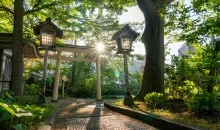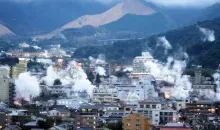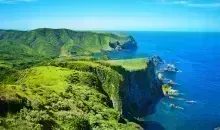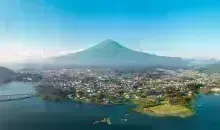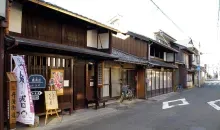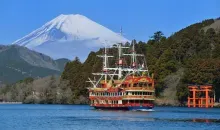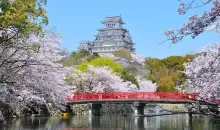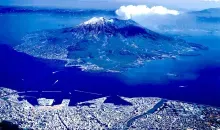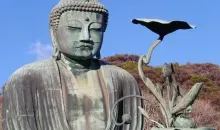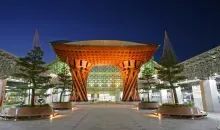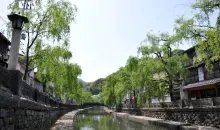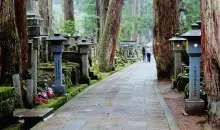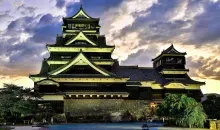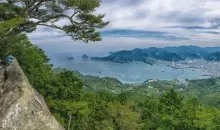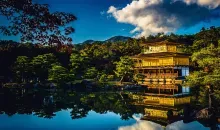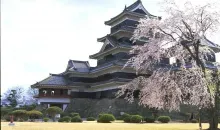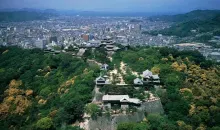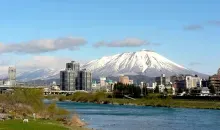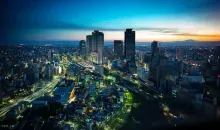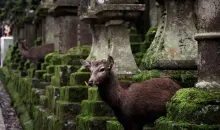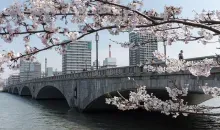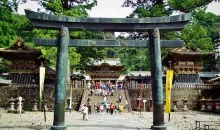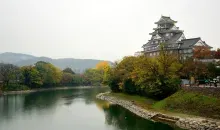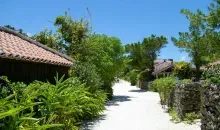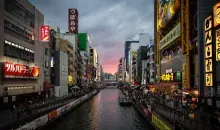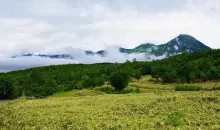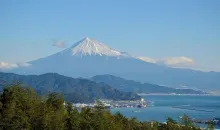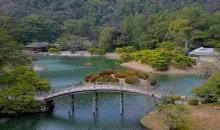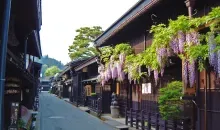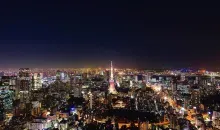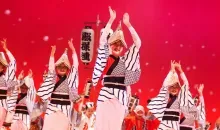Ise 伊勢
Local Time 17:05
Symbol : cloudy_rainy
Temp : 25.4°C
Date : Heute
Symbol : cloudy
Temp : 19.7°C
Date : Morgen
Symbol : cloudy
Temp : 17.4°C
Date : Freitag
Symbol : sunny_cloudy
Temp : 20.9°C
Date : Samstag
Local Time 17:05
Symbol : cloudy_rainy
Temp : 25.4°C
Date : Heute
Symbol : cloudy
Temp : 19.7°C
Date : Morgen
Symbol : cloudy
Temp : 17.4°C
Date : Freitag
Symbol : sunny_cloudy
Temp : 20.9°C
Date : Samstag
Entdecken Sie Japans heiligste Stadt
Verloren in der Präfektur Mie strahlt Ise durch ihre geheimnisvolle Aura. Diese kleine Landstadt, Wiege der Sonnengöttin Amaterasu, beherbergt Ise-Shingu, das heiligste Heiligtum Japans Region. Mit seiner Geschichte und Geographie empfängt es jedes Jahr Tausende von Besuchern, die alle ihre Geheimnisse lüften möchten.
The birthplace of the goddess Amaterasu
Perhaps the most well-established attraction in Ise City is the famous Ise-Jingu Shrine. Arguably the most significant Shinto grand shrine in all of Japan, it was initially erected in honor of Amaterasu, the sun goddess attached to the imperial family, all the way back in the year 4 B.C.E. The religious complex consists of 125 smaller shrines and is said to be "the soul of Japan."
Go through the Uji Bridge to access the Naiku Shrine, the birthplace of the goddess Amaterasu. Ancient visitors believed its wooden construction would wash away their sins from those who pass through it.
The most prized shrine in the country, the Naiku is said to house the yatano kagami mirror, one of the three sacred relics of Japan, and was used to bring Amaterasu out of the cave in which she had been hiding following a violent argument with her brother Susanoo, the god of storms.
Nur einen Steinwurf entfernt, vergessen Sie nicht, dass das Sengukan Museum seine Türen weit öffnet. Es ist für alle zugänglich und birgt insbesondere die Geheimnisse von mehr als 1000 Jahren Wartung der Website !
Ein kulinarisches Zentrum, die gastronomischen Spezialitäten von Ise
Ise ist reich an Spiritualität und auch an Gastronomie . Im Herzen der Stadt, erstreckt sich die traditionelle Oharai-machi mehr über als einen Kilometer. Holzhäuser und Architektur aus Edo (1603-1868) , der vom Fluss Isuzu begrenzte Bezirk bietet eine idyllische Klammer, eine Zeitreise in die Zeit , als Pilger, die nach Ise-jingu kamen, die Gassen belebten.
One of the other crown jewels for scenery in Ise, however, is Mount Asamagatake, elevated above the city and presenting an all-encompassing view of the region. The previously mentioned rich forests and glistening blue waters become one giant landscape from the mountain, which is a popular hiking destination. Historically, the ascent up the mountain was done by pilgrims prior to visiting Ise Jingu. The total journey up and down Mount Asamagatake takes around 4-5 hours.
A city built on artisanal craft
As a UNESCO-recognized city, the culture of traditional artisanal crafts is almost unparalleled in Ise. These crafts span from local specialties to world-recognized luxury items.
Ise City is a treasure trove for those looking for unique crafts utilizing traditional techniques, often made in small numbers and meticulously made by hand.
As previously mentioned, the rich woods of the area have provided Ise with quality lumber to be used for woodworking. A signature of the area is “Ise Shunkei,” the form of lacquerware that is created in the area. Traditionally made with local cypress wood (known as hinoki in Japanese), Ise Shunkei is notable for its rich color and high quality and is simultaneously intended to be used on an everyday basis. As the lacquerware is consistently used throughout the years, it develops a one-of-a-kind patina.
Another storied woodworking craft in Ise is that of Itto-obori sculpting. This is a form of sculpting that is chiseled by hand, derived from the city’s roots, and developed by shrine carpenters who would restore Ise Jingu once every 20 years throughout the centuries. Smaller crafts serve as great souvenirs for the goods, often used as home decor.
Likely the most internationally recognized craft to come out of Ise is that of pearls, as the farm cultivation of pearls originated here by Koichi Mikimoto at the end of the 19th century. Mikimoto is a name many may recognize, as it is the most reputable name in luxury pearl jewelry. The original island that the cultivation process was developed on stands as an attraction, complete with a dedicated museum. Pearls here were initially gathered by the aforementioned ama divers, whose work set the foundation for Mikimoto’s farming process. Fashion and jewelry enthusiasts ought to visit the island and commemorate the genesis of one of the most recognized names in the industry and see the continued art of pearl cultivation in action.
The culinary specialties of Ise
Darin befindet sich die Einkaufsstraße Okage-Yokocho. ermöglicht es Ihnen, lokale Spezialitäten zu entdecken. Udon-, Matsusaka-Rind oder von den Ama des Nachbarortes gefangene Abalone, die unzähligen Restaurants in der Umgebung kochen seit Jahrhunderten gute Rezepte.
Vor allem bei Tee und Wagashi , denn Ise ist der drittgrößte Teeproduzent des Landes . Daraus entstand auch Akafuku , ein mit roter Bohnenpaste gefüllter Mochi, der im 18. Jahrhundert in einem der Teehäuser der Stadt erfunden wurde.
Neben seinen Restaurants, Cafés und Ständen hat Okage-Yokocho viele Souvenirläden zu bieten. Hausgemachter Honig, Keramik und Glücksbringer, die Straße stellt die Handwerkskunst von Ise in den Mittelpunkt!
Besonders jeden ersten des Monats während der Tsuitachi Mairi , der ersten monatlichen Pilgerfahrt, wenn die Geschäfte sehr früh öffnen , um den Mutigen, die nach ihrer Rückkehr aus Ise-jingu nach Oharai-machi kommen, neue Dinge anzubieten.
Additionally, Ise is the third-largest tea producer in the country, where tea and wagashi are favorite snacks. Akafuku, a mochi stuffed with red bean paste, was invented in one of the city's tea houses in the 18th century.
In addition to its restaurants, cafes, and stalls, Okage-Yokocho has many souvenir shops. Homemade honey, pottery, and lucky charms highlight the craftsmanship of Ise!
During the first of the month, Tsuitachi Mairi (the first monthly pilgrimage), stores open very early to offer new things to the brave who come to Oharai-machi after their return from Ise-jingu.

Ise-ebi
takaokun on Flickr, CC BY 2.0
Die besten Restaurants in Ise
AkafukuHonten : Akafuku-Spezialist
Adresse : 26 Ujinakanokiri-cho, Ise-shi, Mie-ken
Öffnungszeiten : von 5 bis 17 Uhr
Ebiya : seit mehreren Generationen in Abalone
Adresse : 13 Ujiimazaike-cho, Ise-shi, Mie-ken
Öffnungszeiten : 9 bis 17 Uhr
OiseyaHonpo : berühmt für Matsusaka-Rind
Adresse : 94-7 Ujinakanokiri-cho, Ise-shi, Mie-ken
Öffnungszeiten : 10 bis 17 Uhr (Achtung, die Öffnungszeiten ändern sich regelmäßig)
Iseman Naiku Mae Japanese Sake Factory : Die einzige Destillerie in Ise, in der Sie Amazake, Yuzu-Sake und Pflaumen-Sake finden.
Adresse : Okage Yokocho, 77-2 Ujinakanokiri-cho, Ise-shi, Mie-ken
Öffnungszeiten: 9:30 bis 17:30 Uhr (Zeiten können regelmäßig variieren)

Une des rues du quartier d'Okage Yokocho
Wikipedia
Futami Onsen: Relaxation amongst natural beauty
Futami Onsen is a premier destination in Ise, home to some of the most amazing scenery in all of Japan, centered around warm and relaxing onsen hot springs with luxurious accommodations.
The most famous landmark at Futami is Meoto Iwa, or “the wedded rocks.” The two holy stones are connected by a rope structure known as a shimenawa. The two rocks represent the connection between two of Shinto’s most significant deities: Izanami and Izanagi, the mother and father of Japan within the Shinto mythos. On clear mornings, the sun can be seen rising between the two rocks, encompassing much of the most emblematic features of the Japanese archipelago into one scene. The beaches in the area are also lauded, making them popular with both those who wish to take the time to relax and those who wish to indulge in nature.
Futami Onsen is one of the most significant locations regarding Japan’s traditional spirituality and history, and being able to witness such while indulging in top-tier comfort and accommodation makes it one of the most eclectic destinations in all of Japan.
Halbinsel Shima, Sehenswürdigkeiten in der Nähe von Ise
Abgesehen von diesen Sehenswürdigkeiten werden wir etwas mehr Zeit in Ise verbringen, um den Nationalpark der Shima-Halbinsel zu genießen, insbesondere die Futami-Bucht , wo wir die berühmten Meoto Iwa-verheirateten Felsen sehen.
AuNord (Toba), es ist eine ganz andere Berühmtheit als Amaterasu, die die Massen anzieht: Mikimoto, Begründer der japanischen Perlenkultur. Weil die lokalen Gewässer seit langem die Heimat von Perlenaustern sind, die früher von handwerklichen Tauchern geschnorchelt wurden . Sie tauchen jetzt nur noch für Touristen, aber ein Museum (Mikimoto Pearl Island) ist eine Hommage an ihre Traditionen und insbesondere an die Methode, die es Mikimoto Kokichi ermöglichte, die Perlenzucht zu einer florierenden Industrie zu machen.
Der Süden der Halbinsel ist ruhiger, aber weniger bedient. Auch fotogener , denn die zerklüfteten Küsten bieten ein herrliches Panorama auf die 60 Inseln der Ago Bay und die Perlenfischerboote, während Goza ein kleiner Fischerhafen ist, der nur einen Steinwurf von einem breiten weißen Sandstrand entfernt ist (Goza-shirahama).
Lust auf Ise ?
Entdecken Sie auch diese Städte








